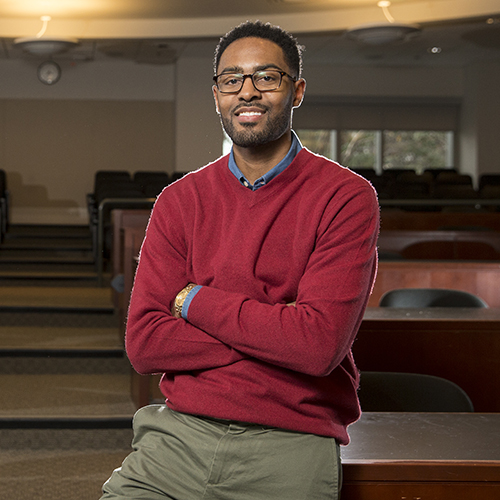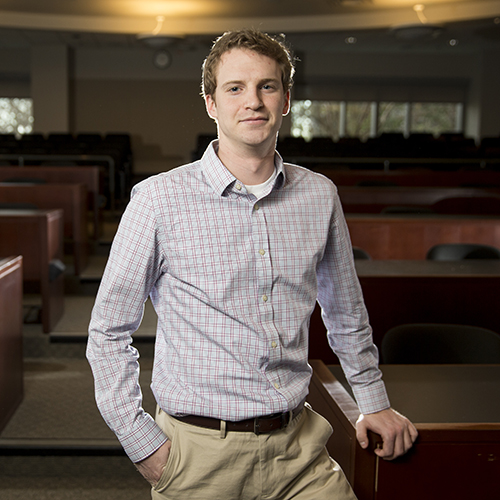 Will Belton J.D./M.S.F. ’16 didn’t start Vanderbilt Law School intending to pursue a dual degree in finance. After earning his undergraduate degree in psychology at Morehouse College, Belton played professional basketball in Qatar for two years and spent two years working as a bankruptcy and credit counselor in Atlanta before deciding to pursue a career in law.
Will Belton J.D./M.S.F. ’16 didn’t start Vanderbilt Law School intending to pursue a dual degree in finance. After earning his undergraduate degree in psychology at Morehouse College, Belton played professional basketball in Qatar for two years and spent two years working as a bankruptcy and credit counselor in Atlanta before deciding to pursue a career in law.
By his 2L year, Belton knew he wanted to focus on transactional practice. From his perspective, Vanderbilt’s innovative J.D./Master’s in Finance, offered by the law school in conjunction with the Owen Graduate School of Management, provided an irresistible opportunity to gain valuable expertise in finance and accounting that would inform his law practice without extending his studies beyond three academic years.
After he graduates in 2016, Belton plans to join Baker Donelson, where he has worked in the corporate and securities group for the past two summers. He believes the teamwork and delegation skills he has learned through his coursework at Owen, where students work in teams to complete and present projects, will enable him to do a better job of structuring complex financial transactions for his firm’s clients. “The deals are huge, there are lots of moving parts, and you have to parse them out to members of a team,” he said. “Your duties on one deal may be different than your duties on another. I’ve learned a lot about delegation and how to break down a project into manageable parts by working on team projects at Owen.”
The J.D./M.S.F. dual degree allows students to gain expertise that is highly valued by law firms and their business clients, but which is rare among law students graduating into today’s legal employment market, according to Randall Thomas, who directs Vanderbilt’s Law and Business Program. “Lawyers in transactional practice must have a good understanding of accounting and finance,” Thomas said. “The businesspeople they work with are quite conversant in those languages, and they expect their lawyers will understand the issues. The J.D./M.S.F. allows students to get the same technical training in finance and accounting their clients receive, and they study with MBA students—their future clients.”
Thomas worked with the deans and faculties of VLS and Owen to structure the dual-degree program, but many of the pieces were already in place at both schools. For example, VLS already offered introductory courses in finance and accounting as second-year elective for students interested in working as transactional lawyers. “Students typically take these courses if they lack a background in business and finance,” Thomas said. “The J.D./M.S.F. program allows them to augment these basic skills by taking a full semester at Owen during the fall of their third year to get a thorough grounding in the principles of finance and accounting.”
Owen also had a robust master’s in finance program, and its former director, Kate Barraclough, had worked closely with Thomas and other faculty at both schools to set up the program. “It’s rigorous,” she stressed. “Students take some of our most challenging finance classes—the more quantitative classes—because we wanted to make sure all the Owen credit hours really counted toward finance.” J.D./M.S.F. students take their Owen classes with students in its M.S.F. program.
After spending their fifth semester studying finance and accounting at Owen, J.D./M.S.F. students split their class load between the law school and Owen during their final semester.
 Dan Ward, J.D./M.S.F. ’16, plans to join Calfee Halter & Griswold in Cleveland, Ohio, where he will focus on patent law, after graduating in May. Ward, who earned his undergraduate degree in chemical engineering from Miami University of Ohio, chose the program as a way to gain insight into the business world without adding a year to his studies. “This program is an excellent way to socialize yourself in the business context, to know what your clients are thinking and how to relate to them, and build value,” he said.
Dan Ward, J.D./M.S.F. ’16, plans to join Calfee Halter & Griswold in Cleveland, Ohio, where he will focus on patent law, after graduating in May. Ward, who earned his undergraduate degree in chemical engineering from Miami University of Ohio, chose the program as a way to gain insight into the business world without adding a year to his studies. “This program is an excellent way to socialize yourself in the business context, to know what your clients are thinking and how to relate to them, and build value,” he said.
He also appreciates the program’s strong emphasis on the mechanics of financial transactions and the exposure to finance. “The coursework at Owen is hard-core finance,” he said, “and the networking opportunities are great because the people you’re working with everyday there are going to be at investment banks and firms. On a practical level, that was a great value-add for me.”
Ward applied to the program after talking with Kevin Saunders J.D./M.S.F. ’14, an associate with Baker Hostetler based in Cleveland, Ohio. He also discussed the program with the partners at Calfee Halter & Griswold. “They loved the idea,” he recalled. “It doesn’t take extra time to complete law school, and it’s one more asset I bring.”
A member of the first class of J.D./M.S.F graduates, Saunders comes from a third-generation family business background and earned an undergraduate degree in accounting at Ohio State before deciding on Vanderbilt Law School. He found the program a perfect fit because it combined his two career passions, business and law. He had already taken four credit hours at Owen as law electives when he heard about the J.D./M.S.F. program. “I’m a huge proponent,” he said. “It really made that third year count.”
After two years of law classes focused on developing critical thinking, writing and speaking skills, Saunders found the added dimension of the M.S.F. coursework “intense but refreshing—it allowed you to think quantitatively and develop the other side of your brain.” He also believes his finance coursework enhanced his preparation for working on team projects at Baker Hostetler. “You don’t work on an M&A deal or due diligence project alone—you’re part of a team of three or four other attorneys,” he said. “Learning how to work in a group dynamic and manage personalities and skills to achieve a final outcome transfers over to the practice of law quite well.”
Another 2014 graduate, Patrick Tricker, believes his J.D./M.S.F gave him an edge in the job market. “The partners at my firm were really impressed with the degree—especially the heavily mathematical, quantitative component,” he recalled. Now an associate with Davis & Harman in Washington, D.C., where he focuses on tax work on life insurance products, Tricker has found his finance training valuable when working with clients. “We deal with spreadsheets created by actuaries, and it really helps if you fully understand the concepts and math that connect the cells,” he said.
According to Dean Chris Guthrie, the program has also attracted interest from alumni who have generously provided financial support for J.D./M.S.F. students.. “Owen is literally right next door to us, which is another advantage,” Guthrie said.
The program grew out of discussions between Guthrie and Owen Dean Eric Johnson shortly after Johnson’s arrival in 2013. Both deans say that the program expands a natural partnership between the two schools as well as increasing the options available to students interested in both business and law.
In addition to appealing to law students interested in careers in corporate law, Guthrie believes the program’s specific focus on finance and accounting will give its graduates an added edge and a wider range of career opportunities. “I am very bullish on the opportunities the J.D./M.S.F. program creates for a select group of Vanderbilt Law students,” Guthrie said.
The J.D./M.S.F. builds on the law school’s existing Law and Business program, which offers law students a specialization certificate in business. VLS has offered a four-year J.D./M.B.A. program in conjunction with Owen since the 1980s.
Prospective students must take the GMAT and the LSAT, and apply separately and be admitted to both the J.D. program by the law school and the M.S.F. program by the Owen Graduate School of Management. The J.D./M.S.F. is a six-semester program; students spend their first four semesters at the law school, their fifth semester at Owen, and their final semester at the law school. “Because J.D./M.S.F. students take their first classes at Owen in their fifth semester, prospective students may apply for admission to the M.S.F. either at the same time they apply for admission to the J.D. program or as first- or second-year law students,” said Todd Morton, the law school’s dean of admissions. “Space is limited, however, so we encourage J.D. applicants who know they’re interested in this dual degree to apply to the M.S.F. program before entering law school, but we also welcome applications from first- and second-year law students for any remaining slots.”